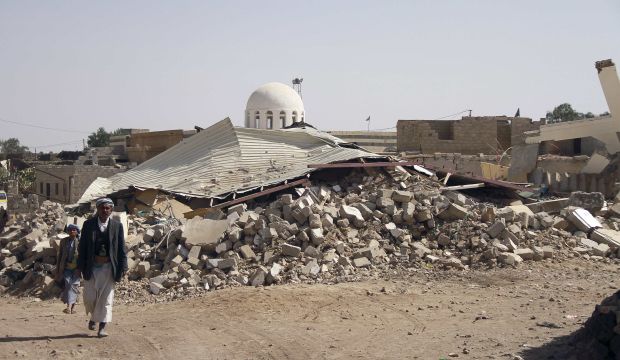
People walk past debris of a building in Arhab, north of Sana’a, that was reportedly bombed by Houthi militants, on January 13, 2015. (Reuters/Stringer)
Sana’a, Asharq Al-Awsat—The Houthi rebels’ growing involvement in state affairs and exposure to confidential documents could pose a risk to Yemen’s national security, senior Yemeni sources have warned.
A high-level Yemeni government official, who spoke on the condition of anonymity, told Asharq Al-Awsat: “The most dangerous thing that has happened since the Houthi takeover of Sana’a is [the group] becoming familiar with national security files and confidential military issues.”
The source said it was necessary to prevent the leaking of the information to other groups affiliated with the Houthi movement, the Shi’ite group that now controls almost all state institutions in the capital Sana’a.
Since its successful takeover of Sana’a in September, the group has gained significant influence over government affairs: firing and appointing officials and occupying key financial and military headquarters, including the Central Bank of Yemen.
Houthi interference has prevented the smooth operation of government departments, the source maintained, with PM Khaled Bahah considering the suspension of all public activities until the group withdraws its militants.
The source said: “They [Houthis] interfere in financial and administrative affairs without having an official capacity, which impedes work in [government] departments, especially since they exercise hegemony and use weapons to intimidate staff.”
“Bahah’s government is struggling to survive and all its activities are threatened with failure,” the official said, blaming the Houthis’ dominance on “failed steps” on the part of President Abd Rabbuh Mansur Hadi.
“The government’s image is now shaken in the eyes of the Yemeni street as its duties have become confined to ordinary and routine issues while all significant files lie in the hands of the [Houthi-affiliated] Ansar Allah group.”
After staging month-long rallies against what they described as discrimination against Yemen’s Shi’ite minority, Houthi militants deployed across Sana’a and took control of almost all military barracks and state departments. The Shi’ite group has failed to comply with the terms of a UN-sponsored deal, dubbed the Peace and Partnership Agreement, that was intended to see Houthis pull out of the capital and lay down weapons.
Many in Yemen blame the central government for failing to act and believe that the swift rise of the Houthis was facilitated by government officials who sympathize with former President Ali Abdullah Saleh.
Houthis and Saleh supporters are running a joint operations room from Sana’a to “organize steps and priorities with regards to taking control of state institutions,” the source maintained.
In western Yemen, thousands of protesters in Al-Hudaydah called on Houthis to immediately release locals they abducted in mid-October last year. The protesters demanded that all Houthi-affiliated militias withdraw from their city, describing them as occupiers.
Meanwhile, senior members of the Al-Hirak Al-Tuhami, an anti-Houthi group, based in Tihamah, said they wanted President Hadi to involve them in government decision-making.
Speaking exclusively to Asharq Al-Awsat, the founder of Al-Hirak Al-Tuhami, Khaled Khalil, said: “[We call on] President Hadi to involve the people of Tihamah in political decision-making and incorporate them into the Peace and Partnership Agreement.” Tihamah is the historical term for the Red Sea coastal region stretching from Yemen to Saudi Arabia.
He also called on Houthi militias to leave the city and end the chaos they have caused in its civil and military establishments.
The official said his group does not recognize the Peace and Partnership Agreement since they did not sign it, and that they are being prevented from participating in the country’s political process.
Separately, President Hadi told a board of advisers on Thursday that presidential, parliamentary and municipal elections will be held very soon, urging all sides to stick to the UN-sponsored deal and the Gulf Cooperation Council (GCC) initiative.
Following a wave of public upheaval against his rule beginning in 2011, former president Ali Abdullah Saleh signed a GCC-proposed deal that saw him step down in favor of his deputy Hadi in February 2012.
“The conditions in general require concerted efforts and cooperation to establish security and stability and in order to complete the remaining terms of the transition period in accordance with the requirements of the GCC initiative and its executive mechanism . . . and the Peace and Partnership agreement,” Hadi said.
Wael Hazzam contributed reporting from Al-Hudaydah
